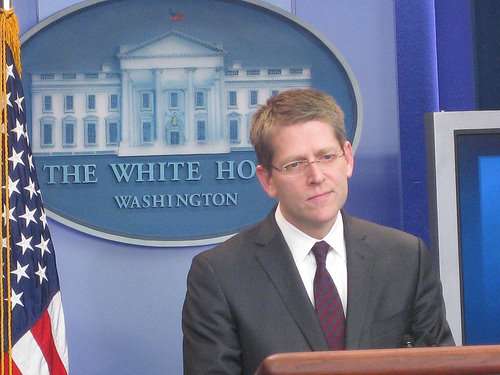The Democrats' Flawed and Contradictory Approach to Spending
Democrats don't quite know what sort of spending problem we have. But they're sure it's one that doesn't require cutting anything.

It has been grimly amusing over the last few weeks to watch senior Democrats try to decide what kind of spending problem, if any, we actually have—as well as what, if anything, they might be willing to do about it.
At the beginning of the year, President Obama reportedly told GOP House Speaker John Boehner that we don't have a spending problem. Instead, he said, we have a health care spending problem. Last week, Democratic House Minority Leader Nancy Pelosi was even more dismissive. "It is almost a false argument to say that we have a spending problem," she said. "We have a budget deficit problem."
A day later, White House press secretary Jay Carney offered a sort of clarification, or at least an update: "Of course, the president believes that we have a spending problem," he said at a White House briefing. And that problem, Carney said, is "specifically driven by" health care spending. "The fact of the matter," Carney continued, "is we need to reduce our healthcare costs. Funnily enough, recognizing that fact, the president took action to do just that through the Affordable Care Act, which has been scored by the CBO to significantly reduce our health care costs going forward."
Each of these professional Democrats is working from the same talking point playbook. But they're not all telling quite the same story.
Let's take these statements one at a time. Assuming the original reporting is correct, Obama's argument to Boehner was essentially that today's spending levels, and, presumably, the deficits that accompany them, are not really a problem. Instead, he said, the real worry is the long-term growth of federal spending on health care. There's some truth here. In the long term, the growth of federal spending on health care, driven by a combination of factors that include aging and health costs, is the biggest single driver of the federal debt.
You might think, then, that Obama's focus would be on finding ways to cut back on federal health care spending. But the most recent news from the Obama White House is that he won't cut Medicaid, the second health care program financed by the federal government, at all—even Medicaid reductions he might have considered in the past. And while he's suggested that he might consider some sort of technocratic reforms to Medicare's delivery system—as long as they don't cut benefits—Obama is now no longer willing to consider raising Medicare's eligibility age.
On the other hand, Nancy Pelosi's statement was almost the inverse of what Obama said. Pelosi dismissed the idea that we have a spending problem, saying instead that it was a "budget deficit problem." The budget deficit is the annual gap between federal spending and revenues, so this is very much a short term focus, which might be of interest to President Obama, who seems to think the only problem of note is long-term federal health spending.
Pelosi's statement came as part of a recent Democratic push to avoid the automatic spending reduction scheduled to go into effect March 1 as part of sequestration. Democrats have proposed replacing the sequestration cuts with a package that includes tax hikes. At this point, though, it's hard to accept the argument that tax revenues are too low: The fiscal cliff deal at the beginning of the year allowed tax rates to rise for high earners with no spending cuts. And over the next two years, revenues are set to rise by 25 percent, according to the CBO, reaching 19.1 percent of gross domestic product (GDP). Revenues won't just be higher than they are now; they'll be noticeably higher than the 17.9 percent average of the last four decades. The real problem is spending, which is projected to begin rising again as a percentage of the economy in 2017, hit 23 percent of GDP in 2023, and continue on an "upward trajectory."
Finally, there's Jay Carney, who, in slight contrast to what the president was reported to have said, declared that "of course" Obama believes we have a spending problem. I say slight contrast because there's not too much daylight between Carney and Obama: Both indicated that what really matters is the long term problem of federal health spending.
Carney's innovation, however, was to suggest that President Obama had already done something to fix this problem by passing Obamacare. And it's true that in recent years, the growth of health care costs, public and private, has slowed. But some of the slowdown is probably due to the recession. And, more to the point, the slowdown seems to have started years before Obamacare. We don't have a good sense of whether the slowdown is permanent, but even if it is, that won't be nearly enough. The budget situation remains unsustainable.
So is the problem short term deficits or long term health spending? Is it lack of tax revenue or is it the structure of our health care delivery system? Does it matter? Democrats can't agree exactly what the problem is. But whatever it might be, they're sure they're not willing to cut anything in order to fix it.
